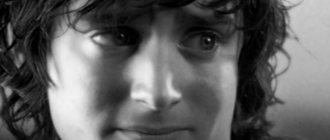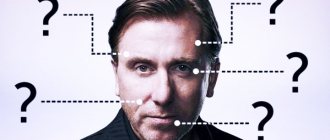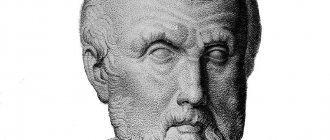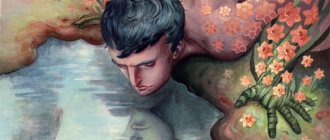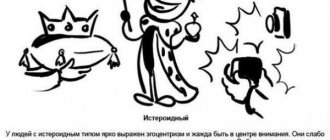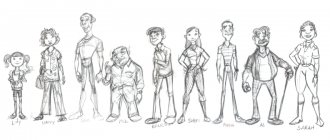According to the classification of character types, many behavioral aspects of a person can be predetermined. Scientists distinguish different types, however, the unstable character of a person is one of the most common among the teenage group.
In the future, the character, as a rule, changes. But there are many people whose unstable character type persists into adulthood.
Psychologically unstable character: should you be afraid?
Character is the greatest multiplier of human ability.
Fisher Kuno
- 1. Traits of an unstable character type
- 2. Formation of an unstable type of character
- 3.Lifestyle
- Only introverts can see these hidden images, thanks to their unique powers of observation.
- Introvert - who is it? The whole truth about introverts
- "Rorschach stains" or a test for psychopaths
- Who do you see first? Your answer will show your personality!
- Psychology of color: How each color characterizes personality
Character traits
Unstable individuals do not like to make choices and take responsibility for them. They say about such people that they go with the flow. Therefore, they usually “wash up” on shores that do not promise anything good. Finding yourself in bad company, where idleness and self-indulgence are only welcomed.
If you control their activities, they will do the work conscientiously, but as soon as they are distracted for a short time, they immediately sabotage the entire process and devote themselves to relaxation to the fullest, without regretting previously expended efforts.
It's all about weakness of will; this psychotype is not able to adhere to the regime and deny himself pleasures.
Emotionally also unstable, capable of committing rash acts, focusing only on impulses. A complete lack of rationality often leads to dire consequences.
Building a strong, healthy family or achieving career heights is not so easy if you constantly indulge your momentary desires and impulses.
They don’t like sports and anything that implies hard work, stability and resilience. Attention is attracted only by what promises to give a storm of emotions.
This is why people are mostly into racing. In order to get adrenaline, they can even risk their lives by performing some dangerous stunts without having worked out their riding technique in advance.
They strive for a free life, devoid of problems and various hassles.
What is personality
A personality is a person who enters into relationships with the environment and manifests himself in the process of activity. It is also a set of properties, qualities, mental abilities, physical and emotional characteristics. They make a person individual and are revealed in the process of interaction with society.
Personality is manifested through habits and preferences, the use of accumulated knowledge. Different situations lead to changes in behavior; a person determines tactics based on experience, relying on emotions. Depending on this, there are different types of people. For example, they are divided by their ability to perceive information. Visual learners trust their eyes more, auditory learners trust hearing, and kinesthetic learners trust tactile sensations.
Resources and limitations
They do not appreciate the care and love of their loved ones. Parents, family partners, friends are perceived only as a means of obtaining something that they do not want to organize for themselves.
For example, the psychology of such men is such that they tend to mistake their wives for service personnel. That is, they demand to fulfill their duties without giving anything in return.
Why don’t they help with household chores at all, considering cooking and cleaning not a man’s job? Even if they are unemployed, while the spouse is also officially working somewhere.
Unstable people are not the best friends; they will exchange a loyal and close person for the company of those with whom they can have fun. This happens because they do not need relationships, but at the same time they categorically do not accept loneliness.
They do not know how to empathize and care about others. The reasons are simple - they simply do not experience feelings of pity, guilt, and try their best to avoid sadness and pain. That is why they live one day at a time, without thinking about the future.
For example, if they have a large sum of money in their hands, they will immediately spend it on entertainment. And you won’t even think about using it rationally or putting it aside for some extremely necessary needs.
Despite the fact that the main signs of an unstable type are rather negative, there are also positive aspects to their character.
They can be useful for people who do not know how to have fun and relax. That is, those who are overly responsible and serious. After all, sometimes you really need to rest, listen to your desires, realize them without feeling guilty for allowing yourself a little joy.
Personality types in psychology
In psychology, there is a classification of people according to personality types:
- Explosive. A person reacts violently to events or words and is characterized by increased excitability. He is sullen, usually cruel and overly impulsive;
- The hysterical type wants to be recognized and noticed. For him, the main thing is the presentation of himself and his own emotions. He is extravagant, his behavior is theatrical. Such a person is fickle and cannot be called sincere. He overacts, trying to increase his importance;
- The asthenic type is fearful, too vulnerable people. They have little stamina and get tired quickly. A person is always preoccupied with something, tends to invent illnesses and create problems. The sad mood hides behind a mask of indifference, sometimes it seems too cheeky;
- The psychasthenic type is overly anxious and indecisive. He always doubts his actions and regrets what he has done. Such people double-check everything, are prone to pedantry, and follow instructions exactly;
- The schizoid type avoids contacts, finds it difficult to establish communication, and is unable to empathize. A person finds himself in creativity, escaping from reality. He is cold, angular, awkward, afraid of new things.
Childhood
Children with unstable character accentuation according to Lichko are distinguished from others by their restlessness. They are disobedient and at times uncontrollable.
They can be punished countless times. Explaining why it is forbidden to do something, even until you become hoarse, will still not take requests and decrees into account.
The will is poorly developed, and accordingly, they are unable to force themselves to study, work and help their parents with household chores.
They want to have fun all the time, have fun and just relax. They are easy to control because they are quite cowardly. Therefore, if you intimidate such a child at least a little, he will be ready to do anything just to avoid something terrible.
By the way, due to cowardice and anxiety, children with unstable character types are predisposed to phobic disorders and panic attacks. They often have stuttering, enuresis, neuroses, and so on.
They look for every opportunity to avoid studying. At older ages they skip school. And in the first grades they can pretend that they are not feeling well, lying that they have already completed all the assignments.
They are usually characterized as children with deviant or even delinquent behavior.
That is, inclined to commit acts that are hooligan, or even illegal.
They try cigarettes, alcohol, and drugs early. And not because they like the taste, the state of intoxication. They just want new sensations and impressions. Otherwise, life seems gray and dull, and this is what they fear most.
They run away from classes and walk around the city, looking for people like them to have a lot of fun. They also gain sexual experience early, among the first among their peers. They are often familiar with various perversions.
There can be no talk of fidelity in later life. They don’t see anything reprehensible in cheating, because they are completely unable to resist temptations.
By the way, the desire of parents to control their every step only provokes them to run away from home. So, in raising children with an unstable type of character accentuation, one should learn to maintain a balance between overprotection and complete permissiveness.
Although, if a person is already mature, excessive control, on the contrary, helps him lead a normal social life without addictions and other manifestations of deviance. Provided that he will be under care literally every second.
Classification of people by temperament
Few people know that the founder of the definition of personality types is the famous ancient Greek physician and philosopher Hippocrates. Being a leading doctor of his time, he conducted many interesting experiments.
Since Hippocrates was a supporter of materialism, he tried to find a connection between temperament and the amount of one of 4 fluids in the body: lymph, blood, yellow and black bile.
As a result, he introduced 4 main types of temperament:
- choleric;
- phlegmatic person;
- melancholic;
- sanguine
According to Hippocrates, yellow bile predominated in the body of choleric people, black bile - of melancholic people, lymph - of phlegmatic people, and blood - of sanguine people.
For obvious reasons, modern medicine cannot take seriously these conclusions of the famous ancient Greek doctor, who did not leave behind any explanation as to how he managed to identify such patterns.
An interesting fact is that Hippocrates compared a person’s character with his physical health. He believed that in our body thoughts, the state of organs and emotions are inextricably linked.
In modern medicine and psychology there is such a direction as psychosomatics. Psychosomatics (“psyche” - soul and “soma” - body) studies the influence of psychological factors on the occurrence and course of somatic (bodily) diseases. By approaching this issue correctly, many people have managed to get rid of various ailments associated with psychosomatics.
The reason for dividing people into types
In psychology, it is customary to distinguish types of people, dividing them into groups, depending on behavioral reactions, emotional manifestations, tendency to excitability and intellectual abilities. There are many online tests that allow you to assess temperament or character, helping to determine how a person will behave in a non-standard critical situation.
Note! Survey data is used when hiring to understand whether the applicant is suitable for the chosen position. It is useful to notice a person who is called a “narcissist”
It’s hard to work with him, because he doesn’t see anyone around him and doesn’t respect other people’s opinions.
Some rely on test data to find their soulmate. Theories have been developed about the compatibility of people with similar or different character traits and social attitudes.
To select employees, it is important to evaluate the relationship between initiative and responsibility and to evaluate people’s activity. Based on this feature, Ksenia Aleksandrovna Slavskaya, a psychologist and philosopher, created a classification of personality types, where, for example, the harmonious type included people who proposed an action plan and were responsible for its implementation
Contemplative - they put forward an idea, but could not cope with it on their own. Personality typology is used by pedagogy in order to eliminate conflicts and normalize the atmosphere in the team.
Children's group
Additional Information
There is a direction in psychology that studies corrupt behavior, this is important when interrogating suspects. A brief description of such personality types - the use of psychological defense methods, speed in decision making, a sense of impunity
Modern problems of psychological classifications
Problems of psychological classifications are associated with the high complexity and ambiguity of mental reality. It is much easier to classify the material world.
In psychology we are faced with the fact that with the help of consciousness we can study consciousness. Here new opportunities open up, but also new limitations associated, in particular, with subjectivity and its overcoming. As is known, in the human psyche there are conscious and unconscious components of cognition. They often work independently, as two different assessors of the situation. Therefore, assessments using projective tests (which are aimed at exploring the unconscious) often conflict with self-assessments using questionnaires (which appeal to consciousness or conscious behavior).
To assess a psychological type, it is important that the measuring instrument (test, technique) be “calibrated” not for the present and relevant, but for the typical, more likely to be repeated throughout life. That’s why methods that allow typologists to see the present through the prism of an individual’s entire life journey are so important: biographical, structured conversation, longitudinal observation in a natural situation
Such methods are well developed in clinical research. When working with healthy people, they are rather the exception.
Example:
Personality research program of Lazursky A.F.
The issue of training a qualified specialist in the field of research and diagnosis of types is an independent problem. You need a whole range of knowledge and skills.
of the diagnostician is important for measuring psychological type.
to see not individual fragments of mental reality, but to operate with systems (cognitive, value-motivational, emotional, volitional) and take into account their holistic nature, knowledge of stable variants of these systems, and the ability to compare them. Comparing and evaluating these systems is complicated by the lack of a well-developed methodological framework: there is no consensus on what to compare and how to evaluate.
To the researcher
it is necessary to be able to work with both qualitative and quantitative methods of studying empirical reality, taking into account the following factors:
- The scale and complexity of the study (the ability to draw and take into account several plans at different scales)
- The nature and specificity of the distribution of properties and characteristics in the environment under study.
- A minimum set of subscales that do not violate the completeness and construct validity of a psychological property.
Jung's typology
The basis for dividing people into psychological types is the tendency to predominantly direct vital energy (libido) outward to the situation or partners (extroversion) or to refrain from spending energy and influencing oneself from the outside (introversion). Hence the openness and sociability of pronounced extroverted types and the isolation and tendency to solitude of introverted psychotypes.
Both types of behavior are biologically based. In the animal world there are also two ways of adapting to the environment. The first, “extroverted” - the desire for unlimited reproduction in combination with the weak functioning of defense mechanisms (as in rats, rabbits, lice). The second, “introverted” - a small number of offspring with strong protective mechanisms (in most large mammals). Like animals, what an extrovert achieves through mass contacts with the outside world, an introvert achieves through a maximally independent position.
Carl Jung first introduced the concepts of extraversion and introversion as the main types of ego orientation. And later he supplemented his psychological typology with a description of four basic mental functions:
- thinking (logic);
- feeling (aesthetic judgments and ethical values);
- sensation (perception through the senses);
- intuition (unconscious perception).
Each of the basic psychological functions can be directed both outward and inward - the extraversion-introversion criterion. According to which of the functions is more developed (leading), the individual can be classified as a thinking, feeling, sensing or intuitive extrovert/introvert. The opposite of the predominant function is repressed into the unconscious and gives rise to interesting effects. For example, the thinking type does not like excessive displays of emotions, shouting, or pathos. But the “thinker” will receive the greatest pleasure from communicating with the emotional feeling type.
Completion
And that’s all for today, dear readers! We invite you to familiarize yourself with each existing type of character accentuation. To have complete information about what kind of people there are. Then it will become easier to build relationships with them and understand the motives of their actions. Accept them as they are, without demanding the impossible.
You can start, for example, with the cycloid psychotype.
Take care of yourself and be happy!
The material was prepared by psychologist, Gestalt therapist, Alina Zhuravina
Read further:
What is a sensitive character type and the main features of this accentuation?
Types of personality accentuation with a description of the nature of each
What is a pedantic type of personality accentuation and what are the main character traits?
6 recommendations for changing the anxious type of character accentuation
Astheno-neurotic type of personality accentuation: character traits
8
UNSTABLE PERSONALITY TYPE.
Unstable personality type (antisocial)
in general, it is characterized by a weakening of volitional functions directly related to the rejection of public moral and ethical standards. Typical defense mechanisms for this type are the mechanism of omnipotent control, regression, denial, conversion, fixation, splitting and dissociation. This is perhaps the most outwardly frightening personality type encountered in the world of psychiatry. The teenage period of unstable individuals is perhaps the most difficult in their lives. This period of time is characterized by a weakening sense of attachment to their parents. Reverence and love for parents even in childhood is only formal. Deceit and manipulative abilities allow them to escape from the care of their parents. From time to time you have to deal with suicide attempts of this type. But all of them are in the nature of blackmail behavior, a game through which they gain the freedom of action that they need. Sports sections and technical clubs most often make do with them. Although in a number of cases it was necessary to observe teenagers of this type attending martial arts and boxing sections. But the interest in such activities was always of applied interest and was quickly abandoned by them. This is easily explained, since attending such events is associated with certain rules and discipline, which is unusual for this type of personality. The tendency to group, experiments with alcohol and drugs, reactions of emancipation and opposition form the basis of the behavior of an unstable teenager. During this same period, their cruelty and aggressiveness towards the world around them is most noticeable. This type is very interesting in terms of choosing their profession. The fact is that they are relatively indifferent to their future in their youth. This is not to say that they are not at all interested in it. Many of them, describing their plans, point to the need for material well-being and freedom of action. At the same time, almost everyone pointed to such an obligatory point as the lack of effort to acquire these material values. Relative control of their future still remains with the parents. And this is provided that this control brings impressive dividends to this type. These people rarely tell the truth. They cannot be trusted in anything, since these individuals do not have firm principles, and the concept of morality and duty is alien and unacceptable to them. However, the art of manipulation, complete, but sometimes well-hidden unprincipledness and risk-taking often lead this type of personality to key positions in politics, economics, government and law enforcement agencies. From persons of this type revolutionaries are born in the literal and figurative sense of the word. And, of course, this type of personality is the fifth column of the criminal world. After re-reading the description of this person, a terrible picture of a potentially criminal element with loose manners, boorish habits and obscene turns of speech appeared before my eyes. But in fact, for the most part this is not the case. A similar picture can be observed in these individuals only during adolescence, and even then not in all cases. Moreover, the paradox of this type is that in some cases these types, as they grow older, sometimes become outwardly absolutely adaptive, which indicates a high degree of survival in extreme environmental conditions. If a given person, due to circumstances, avoids self-destruction and does not end up in places that are not so remote, then starting from adolescence, she begins to “burn out.” For example, I remember several personalities that I observed in the nineties. They did not imagine themselves outside the criminal circle, however, as the country emerged from the crisis, they exchanged their leather jackets for white shirts and successfully operate within the framework of legal business and entrepreneurship. I also observed representatives of this type of personality among representatives of government agencies and show business. Thus, this type of personality is not in all cases associated with the phenomena of the criminal world. Pointing to an unstable (antisocial) personality type, I am talking only about the patterns of development, characterological properties and internal motivation of a group of people. And with a favorable combination of circumstances, this person can achieve, thanks to his characterological properties (the ability to take risks, manipulative abilities), a high position in society and become an outwardly exemplary citizen of his fatherland. But, in fairness, it must be said that in the overwhelming majority of unstable personality types, absolute adaptation does not occur. And if a directed emotional blow throws an unstable person out of balance, then all the luster of a “gentleman from high society” is instantly lost before our eyes. Hence, it can be assumed that when experiencing a personally significant psychotrauma, the unstable type gives decompensation, indicating the “dormant” shadow side of this subject.
Every day we come across different types of people, with different characters and temperaments. You may have had to deal with people who are quite short-tempered. Intemperance is the main characteristic of such individuals. And there is no point in condemning them for this. One can only sympathize with such people. After all, their weak nervous system can provoke the development of asthma, cardiovascular diseases, etc.
Emotional instability
So, emotional incontinence is not a disease, but a personality disorder. It is characterized by impulsiveness in decision making, outbursts of negative emotions, problems controlling one’s own actions, and excessive irritability.
Looking from the outside at an emotionally unstable person, one gets the impression that she is unable to control herself. This is due to the fact that the above signs in such people appear constantly and do not depend on situations, stress factors, etc.
Individuals with emotional incontinence are unable to control their irritability regarding what is happening around them. They strive to find reasons to throw out their emotions. It is worth noting that such people are impatient with the opinions of others and do not tolerate criticism and objections.
Emotional incontinence is characterized by various causes of its occurrence. This can be either as a consequence of a head injury, various diseases (multiple sclerosis), or emotional stress, somatic disorders, etc.
Classification
Incontinence is divided into borderline and impulsive.
- Borderline emotional incontinence is characterized by increased impressionability and vivid imagination. People belonging to this type take personal failures or obstacles encountered in their lives too seriously. They often exaggerate any circumstances that have happened, and this often leads to stress. Such incontinence finds its manifestation already in adolescence. During this period, the teenager’s desires prevail over generally accepted prohibitions and rules. Such individuals are characterized by restlessness and frequent mood swings, which is the cause of inattention. People with borderline emotional incontinence suffer from a violation of self-identification, a manifestation of personal weakness in solving life problems. Sometimes this can be the cause of bad habits, crime, and depression. Intemperance and swagger in behavior are characteristic of some of this type of people. The main features of the manifestation of imbalance in the behavior of such people are: jealousy, which is not justified in any way, conflict, and suicidal blackmail is not excluded.
- Impulsive emotional incontinence is characterized by increased excitability of the nervous system. People of this type react to small irritating factors as if they were directed against them. Children with impulsive emotional incontinence exhibit resentment, aggression, capriciousness, and hysteria. If such a person has failed to become a leader, to take a leading position, he withdraws into himself, restraining his aggression against the world around him.
The main signs of this type are: playing with negative emotions “in public”, attacks of anger and rage.
The behavior of such people alienates those around them, and in this regard, in individuals with emotional incontinence, an even more cruel personality is formed, which is not able to build friendly relations with the world around it.
So, every person is sometimes unable to cope with the emotions that overwhelm him. But do not forget that you need to work on your emotions and nervous system so as not to be led by your emotional state.
Related articles:
| Bulimia - treatment If there was a universal pill for all diseases, then humanity would live almost forever. But unfortunately, it exists only in fairy tales, and in reality, most diseases are psychological in nature. Bulimia is no exception. If you want to start fighting this disease, then you need to start with the head. We will tell you further how to do this and what the treatment consists of. | Pornophilia Until recently, it was forbidden not only to talk about sex, but even to think about it. However, after the sexual revolution, not only services of all kinds began to appear, but also human vices. One of them is pornophilia. Why does a person become addicted to the next dose of erotica? We tried to find out. |
| Depression Surely everyone knows the state of mind in which a feeling of heaviness arises. Usually they say that there is a stone on the soul. Psychologists call this state depression. What are the reasons for its appearance and how to remove a heavy burden from the soul? We will talk about this in more detail. | Emotional stress It's no secret that a person's emotional state often becomes the cause of real physical ailments. For example, if you receive banal emotional stress, its consequences can be the most unpredictable. What is this disease and how to avoid it? We'll talk about this later. |
Announcements for neighbors: 25 photos that will make you cry with laughter Iron ladies: 7 shocking transformations of women after the “rocking chair” 5 things that are normal for Russian women, but wild for Eastern women 10 products that are very similar to human organs
| Our stars without makeup: 15 photos that will surprise and even shock | The wind against celebrities: 20+ photos that will definitely make you smile | |
| “Killer” advertisements from Russian streets and public places: 20+ photos | Meanwhile in Australia: 20 photos that will impress and even shock | 20 strange things that are difficult to explain and difficult to understand |
Sources used:
- https://cmzmedical.ru/zabolevaniya/emotsionalno-neustoychivoe-rasstroystvo-lichnosti/
- https://psy.wikireading.ru/68396
- https://qvilon.ru/psihologiya/neustojchivyj-tip-lichnosti.html
- https://avgur65.livejournal.com/4500.html
- https://womanadvice.ru/nesderzhannost
Mixed classifications
Modern system classifications are associated with the names of K. Jung, G. Eysenck, L. N. Sobchik, L. Ya. Dorfman and others. The authors of modern system concepts try to summarize as much as possible the results of empirical studies of individual human characteristics within the framework of a single typological model. Such a model, as a rule, is the center of a structure that combines general, typological and individual psychological characteristics of a person.
Examples
Such system classifications can be: “The Theory of Leading Tendencies” by L. N. Sobchik, “The Concept of the Meta-Individual World” by L. Ya. Dorfman.

